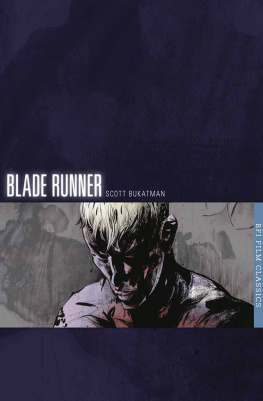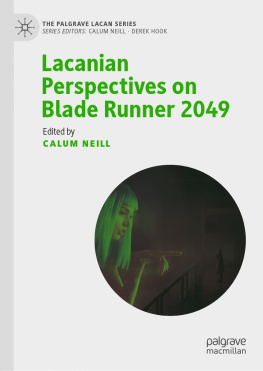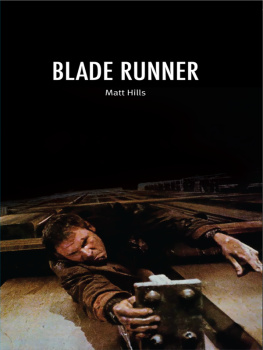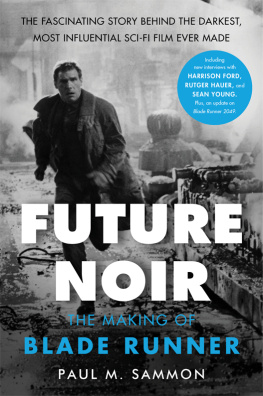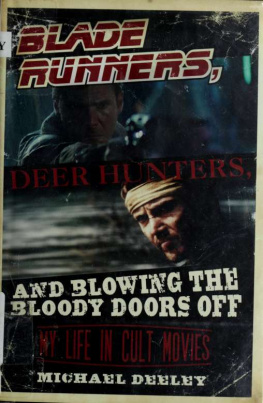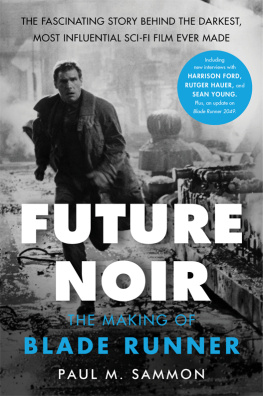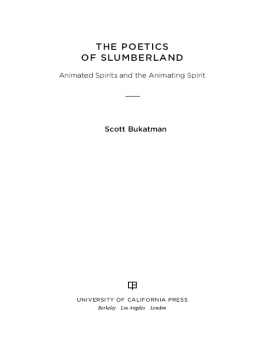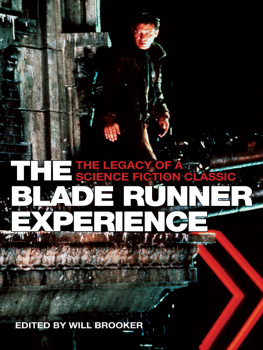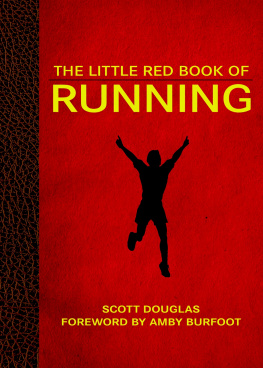Bukatman Scott - Blade Runner
Here you can read online Bukatman Scott - Blade Runner full text of the book (entire story) in english for free. Download pdf and epub, get meaning, cover and reviews about this ebook. year: 2019, publisher: BFI Publishing, genre: Romance novel. Description of the work, (preface) as well as reviews are available. Best literature library LitArk.com created for fans of good reading and offers a wide selection of genres:
Romance novel
Science fiction
Adventure
Detective
Science
History
Home and family
Prose
Art
Politics
Computer
Non-fiction
Religion
Business
Children
Humor
Choose a favorite category and find really read worthwhile books. Enjoy immersion in the world of imagination, feel the emotions of the characters or learn something new for yourself, make an fascinating discovery.
- Book:Blade Runner
- Author:
- Publisher:BFI Publishing
- Genre:
- Year:2019
- Rating:3 / 5
- Favourites:Add to favourites
- Your mark:
- 60
- 1
- 2
- 3
- 4
- 5
Blade Runner: summary, description and annotation
We offer to read an annotation, description, summary or preface (depends on what the author of the book "Blade Runner" wrote himself). If you haven't found the necessary information about the book — write in the comments, we will try to find it.
Blade Runner — read online for free the complete book (whole text) full work
Below is the text of the book, divided by pages. System saving the place of the last page read, allows you to conveniently read the book "Blade Runner" online for free, without having to search again every time where you left off. Put a bookmark, and you can go to the page where you finished reading at any time.
Font size:
Interval:
Bookmark:

BFI Film Classics: A brief history
The BFI Film Classics series grew out of a project initiated by the National Film and Television Archive (NFTVA), a division of the BFI, to build a collection of perfect showprints of 360 key films in the history of cinema. These films were to be screened at the Museum of the Moving Image (MOMI) in London in a year-round repertory. The 360 list of classic films was drawn up by David Meeker of the NFTVA, and the BFI Film Classics books were commissioned to stand alongside the Archive project.
Distinguished film critics and scholars, film-makers, novelists and poets, historians and writers from other spheres of the arts and academia were approached to write on a film of their choice from the 360 list. Each volume was to present the authors own insights into the chosen film, together with a brief production history and detailed credits, notes and bibliography. In a time before DVDs and screengrabs, the books numerous illustrations were specially made from the Archives own prints and sourced from the BFIs stills collection.
The series was developed and its first titles commissioned by Edward Buscombe, then Head of Publishing at the BFI. Colin MacCabe and David Meeker acted as series consultants. Rob White was the Series Editor at the BFI from 1996 to 2005.
The series was launched in May 1992 with four titles: The Wizard of Oz by Salman Rushdie; Double Indemnity by Richard Schickel; Stagecoach by Edward Buscombe and Went the Day Well? by Penelope Houston.
A sister series, BFI Modern Classics, was launched in 1996 to respond to notable films of modern and contemporary cinema. Over 60 titles were published in this series before it was absorbed within the main Film Classics series in 2007, and the combined series was relaunched with a new cover and text design. There are currently over 160 titles in print in the Film Classics, Modern Classics and combined Film Classics series.
A BFI Film Classics series advisory board, comprising representatives from the BFI, as well as leading film scholars and critics, was established in 2007. Since 2008 BFI Publishing titles, including the BFI Film Classics series, have been published by Palgrave Macmillan in partnership with the BFI.

Contents

It seems appropriate that there should be a new edition of my book on Blade Runner, given the many iterations of the film that are circulating out there. My combo pack includes the work-print used for test screenings, both the American and international versions of the 1982 version, the 1992 Directors Cut, that really wasnt, and the new Final Cut from 2007 (about which more later). Its a film worth revisiting, and one that has played no small part in the development of my thinking.
Theres a story that I tell so often that perhaps I should finally put it to paper (or e-ink, or pixels, or whatever). While I was writing my dissertation, which became the book Terminal Identity, I produced an analysis of Blade Runner. It was beautiful: an elegant Althusserian deconstruction that I think involved the commodified image, the reification of the visual, and who knows what else. It was, trust me on this, really good, although its lost now (like tears in rain?). But upon rereading it I realized that any reasonable person would believe that I hated the film which I most certainly did not. Somehow the terms and tenor of my analysis, which centered on the films impact on that unnamed and probably unborn abstraction of the subject slash spectator, simply didnt speak in any meaningful way to my own engagement with the film. Frankly, given my analysis, if you liked Blade Runner then you must have been some kind of ideological chump. I trashed it and began again.
This marked the first move toward a more phenomenological approach to textual and media analysis, as I tried ever harder to bring my own experience to the table. Suddenly it was okay to respect the films dense visuality, its seductive movement, its immersive world-building. Narrative what the film said was at least partly displaced by its spectacularity what it showed. That engagement with Blade Runner marked a turning point in my intellectual life, and it remains a film that gives me a great deal of unalloyed pleasure.
Revisiting Blade Runner in order to think about this preface, I was relieved to say that it holds up well, some 30 years after its initial release. Its astonishing visual complexity translates well to the world of blu-ray and plasma screens, technologies unimagined by the film itself. The retro-fitted world of Los Angeles, in which the old and new are cobbled together in restless juxtapositions has kept the film from dating too badly this still looks like a future that could happen (though perhaps not in the next seven years, which is all that separates us from the films 2019 dateline). The style of the film is retrofitted too, and the noir trappings now lend the film a timeless classicism that is wearing quite well. Heck, even the fashions still look plausible.
Whats also striking about Blade Runner is that it hails from that annus mirabilis for science fiction films, 1982, which also gave the world Videodrome, John Carpenters remake of The Thing, and Tron. Tron pointed the way toward the future of filmic effects, with its digitally generated vehicles and landscapes, but Blade Runner is a film on the cusp. Its ravishing visuals still involve the compositing of physical elements: miniature sets, matte paintings, models of vehicles. Blade Runners world, then, is still ontologically our world, in a way that the digital environments of Avatar (2009) and even Zodiac (2007), are not. I offer this not as nostalgia (well, maybe a little), but as a simple fact. Digital effects are no longer, to a great extent, special effects, seamlessly integrated as they are into the physical spaces occupied by actors or whatever portion of the setting is available in the pro-filmic world. The integration of actors and the effects shots of the pre-digital era posed special challenges, and so many of those special effects are depopulated. As the camera tracks over Los Angeles, circa 2019, the viewer is free to contemplate the space as well as the majestic special effects that are simply and straightforwardly on display. Or again, in that most gorgeous of sequences, as Gaff brings Deckard to police headquarters. The narrative pauses here, as the screen is filled with the intriguing geometries and panoramic movements of both the future Los Angeles and the film that is present, here and now, to the viewer.
The final version cleans up some of the messier moments: wires are no longer visible hoisting hovercars in the air, and the special effects mesh together more cleanly. It also ups the violence, bringing in the more gruesome moments from the 1982 international cut. Most disturbingly, though, it removes the ambiguity of Deckards status as either human or replicant. Yes, Im referring to the new treatment of the unicorn scene, discussed in some detail near the end of this book.
The 1992 version gave us Rick Deckard, drowsily picking out some notes on the piano. There is a mysterious cut to a galloping unicorn moving in slow motion through a forest (what my wife calls the My Little Pony scene), then back to Deckard, seen from behind. The new (I hesitate to call it the final) version gives us an extreme close-up of Deckard, his eyes wide open, then a more beautiful and more extended visit to the land of unicorns, then back to Deckards face. What might have been a dream (or an editing mistake) in the earlier version is now unmistakably some sort of vision, and when Gaff leaves the tell-tale origami unicorn at Deckards apartment at films end, it is hard to avoid coming to the conclusion that the unicorn was an implanted memory, and that, therefore, Rick Deckard is first, last, and always, a replicant.
Font size:
Interval:
Bookmark:
Similar books «Blade Runner»
Look at similar books to Blade Runner. We have selected literature similar in name and meaning in the hope of providing readers with more options to find new, interesting, not yet read works.
Discussion, reviews of the book Blade Runner and just readers' own opinions. Leave your comments, write what you think about the work, its meaning or the main characters. Specify what exactly you liked and what you didn't like, and why you think so.

